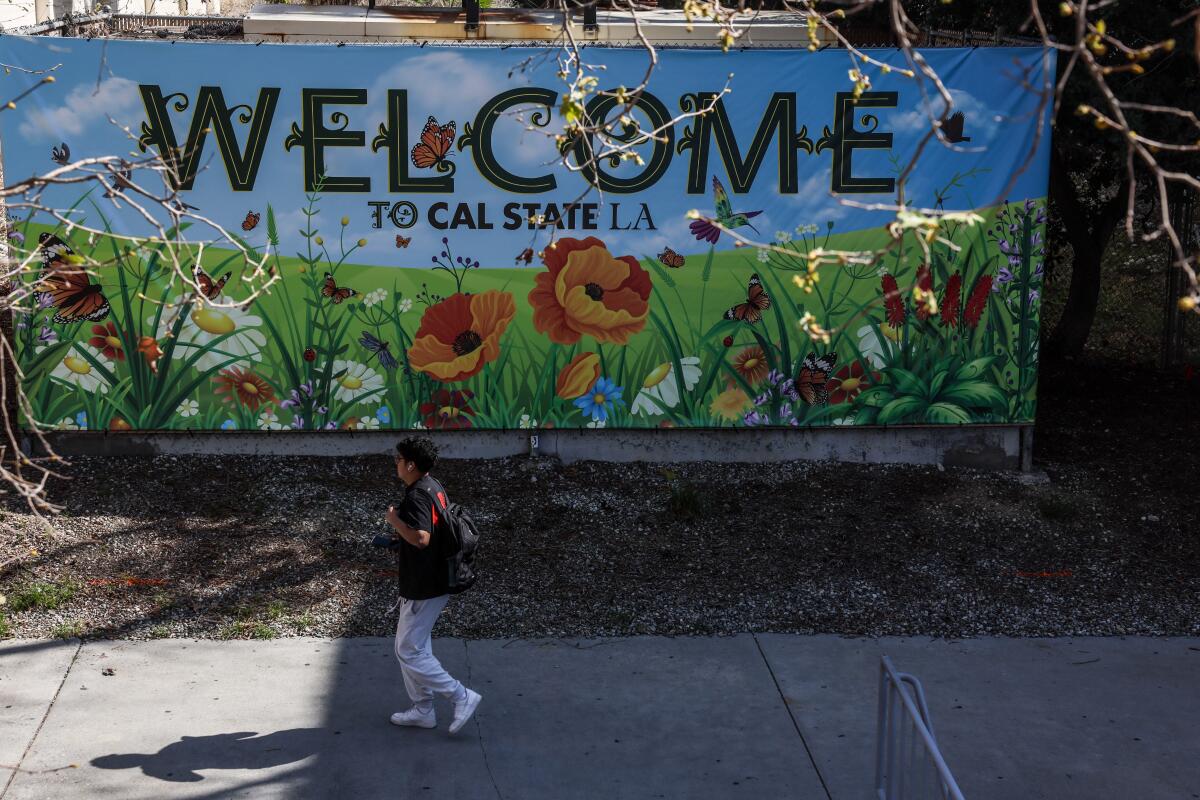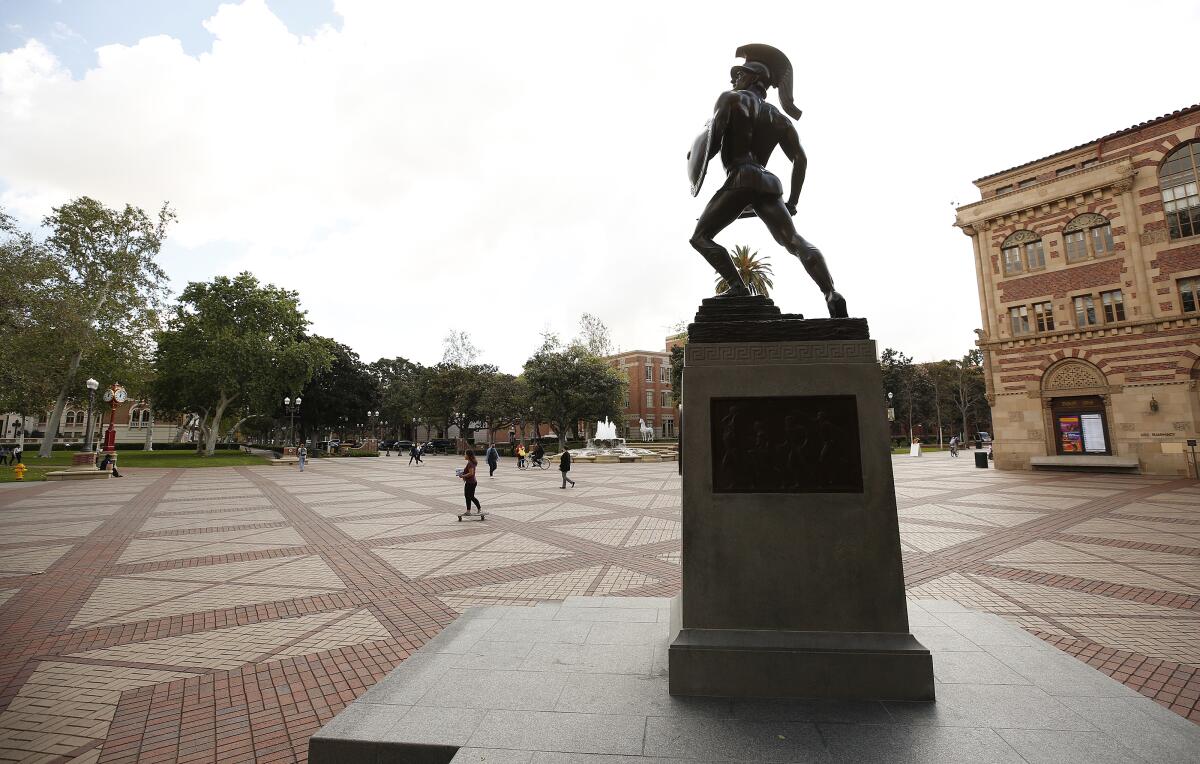How California schools, colleges are responding to Trump’s DEI crackdown

- Share via
- The U.S Department of Education has set a Friday deadline for K-12 schools, colleges and universities to eliminate race-specific programming or face potential federal funding cuts.
- California public universities and many K-12 school systems are defending diversity efforts while carefully avoiding clashes with the administration.
- Debate has ensued over the future of such programs.
With educators facing a federal deadline to abolish race-specific programs or risk funding cuts, California public universities and schools are defending diversity efforts while carefully avoiding clashes with the Trump administration, prompting confusion over the future of traditions including culturally themed dorm floors, Black student graduation ceremonies and scholarships for Latinos.
In a Feb. 14 letter, the U.S. Department of Education told all K-12 school districts and higher education institutions to end the use of race in “admissions, hiring, promotion, compensation, financial aid, scholarships, prizes, administrative support, discipline, housing, graduation ceremonies, and all other aspects of student, academic, and campus life.” It laid out a new federal anti-discrimination enforcement policy, threatening to pull federal dollars from schools that do not fall in line.
The response from many leaders of California universities and schools? Cautious and judiciously worded statements.
So far, the state’s public university systems have not ordered affinity clubs or programming to shut down. Culturally themed dorms still exist. Scholarships have not been rescinded. And, leaders said, they already adhere to California law that banned using race as a factor in admissions under voter-approved Proposition 209.
Schools are on alert after the Department of Education said it would cut federal funding unless they abolished diversity, equity and inclusion programs, potentially including culturally themed campus housing and graduation ceremonies.
University of California President Michael V. Drake, in a letter to all campuses last week, said the system follows state anti-discrimination law and would “evaluate the potential impact” of the Department of Education’s letter. “We encourage UC staff to continue with their work in alignment with all applicable state and federal laws,” Drake said.
The letter was followed by a video message Friday from UCLA Chancellor Julio Frenk. “Our mission has not changed and neither have our values,” he said, adding that senior leaders would host a town hall this week to address a time of “uncertainty” under a “barrage” of White House moves, including those on diversity, equity and inclusion.
“I know there’s a feeling of uncertainty for many in our community right now, and uncertainty can bring fear.... Many across our state are feeling worried and unsettled,” Frenk said.
The office of Chancellor Mildred García of the 23-campus California State University system also issued a brief statement saying that it was “aware of the recent letter” from the Department of Education on DEI issues. “As this type of action is unprecedented, we are consulting with the California Attorney General and higher education partners across the country to better understand the statewide impact of this letter.”

In an interview, Cal State L.A. President Berenecea Johnson Eanes said: “The complexity of our conversation in this country around diversity, equity and inclusion will continue to be something that we will have to manage as a community.”
The California Department of Education and the State Board of Education, which guides the state’s 1,000 K-12 school districts, also issued a brief and limited statement:
“Federal laws regarding public education remain unchanged,” it said, while advising school administrators and boards to “consult legal counsel regarding the impact of any potential federal actions.”
Linda McMahon, President Trump’s education secretary nominee, wants to dismantle the department. What that means for California’s K-12 funding, financial aid and student loans.
L.A. Unified, the nation’s second largest school district, has not changed its policies or practices related to a wide range of extracurricular school-based clubs. Among about 60 listed student groups at Garfield High in East L.A., for example, are the Asian-Pacific Islander Student Union, the Black Student Union, the Vietnamese Student Assn., Razas Unidas and the Gender Sexuality Alliance.
L.A. schools Supt. Alberto Carvalho said the district will review any changes in existing law and will continue to rely on legal support and advice from state officials including Atty. Gen. Rob Bonta and the state Department of Education. The district’s legal staff also is monitoring developments, he said.
California receives billions in federal funding each year. The money supports lower-income college students through Pell Grants and other scholarship programs, public school students with disabilities, Head Start for preschool, and meal programs, among other expenditures.
Asked about what will happen after Friday’s deadline, the Department of Education’s acting assistant secretary for civil rights, Craig Trainor, said in a statement Tuesday that “additional guidance on implementation is forthcoming.”
The letter, which Trainor signed, did not specify what kind or how much funding is at risk. Experts said taking federal dollars away for violating Trump administration directives on race would be a drawn-out process bound to face legal challenges.
School leaders nationwide are grappling with how to respond.
Tensions on campus
Many in leadership positions “are hunkering down, saying, ‘Let’s not be the first target,’” said Ariela Gross, a professor at UCLA who focuses on race and law.
Gross is among two dozen law professors who signed a legal analysis sent to more than 100 universities unpacking how “DEI initiatives remain legally defensible” amid broader federal attacks on diversity programs. In an interview, Gross said the U.S. Department of Education’s letter was an “extremely broad and deeply incorrect interpretation of what discrimination and anti-discrimination mean.”
“Still, it is causing confusion and concern,” she said.
On her campus, programming around race abounds. The university advertises more than a dozen scholarships focused on minority groups, many sponsored by outside benefactors. Undergraduate dorms have “living learning communities” where Black, Latino, Native American and Asian American students can apply for housing or visit to study or attend events — that are open to all races. Each spring, optional “Afro Grad” and “Latinx Graduation” ceremonies take place on the Westwood campus. They are also open to all.
A day after a probe was opened into the CIF for allowing transgender athletes to play girls’ sports, a federal judge blocked President Trump’s executive orders restricting gender-affirming healthcare for transgender youths.
After reading the federal memo, Alex Davis, a UCLA PhD candidate in political science who also attended the university as an undergraduate, called it “worrisome.”
“If they go by this definition of DEI, it basically applies to the majority of what made my undergraduate experience great,” said Davis, who is Black.
That includes the Afrikan Diaspora Community, part of the Rieber Hall dorm, where Black students live and host cultural events. Davis didn’t live there but would frequently visit as an undergraduate for Black film nights, among other programs.
She wondered if the Black Bruin Resource Center, a community support space she helped found as an undergraduate, would be considered a violation by the Department of Education. A former chairperson of the Afrikan Student Union, Davis also participated in the McNair Research Scholars Program, a fellowship that supports students of diverse backgrounds to help prepare them to apply for graduate and PhD programs.
“This all feels like a backlash to the movement for Black lives and all the progress we had made just a few years ago,” Davis said.

At USC, where race-related clubs, dorm communities, graduation events and scholarships have been a part of campus life for years, students and staff have debated whether there will be changes.
The university has not issued any public statements. A spokeswoman declined to comment on the letter.
At UC Riverside, Abby Choy, a senior who participates in Asian American programs, including a Chinese martial arts club, said she found the anti-DEI letter “silly.”
“How would I enjoy college if I couldn’t celebrate my culture and had to suppress it?” said Choy, who plans to attend the campus’ second annual Asian American Pacific Islander graduation ceremony in the spring.
Lawsuit accuses UC of giving racial preference in admissions to Black and Latino students
“My parents are immigrants and I’m the first generation to go to college,” Choy said. “There is such a different feeling in seeing your own people graduate together onstage.”
Sofía Jimenez, a UC Riverside sophomore who is Latina and Indigenous, said her friends frequently talk about federal efforts to dismantle DEI.
“A lot of people think these issues are solved. But they are not. We still need resources and opportunities for us,” said Jimenez, who is part of the Movimiento Estudiantil Chicanx de Aztlán, or MEChA, and has attended Native American campus events.
“The administration says this is racial segregation? It is not. We never keep people separate or kick them out. It’s about sharing our cultures,” she said.
Conservative views
The Trump administration’s move has been hailed by state education leaders in Florida, South Carolina and Louisiana and other conservative-led states — as well as conservative-led California school systems.
In a statement, Megan Degenfelder, superintendent of public instruction for the Wyoming Department of Education, praised the move “to eliminate discrimination.”
“Universities, colleges, and K-12 schools have used discriminatory practices throughout their operations —from hiring and training employees, to admissions and scholarships, and even in human resources and classroom instruction,” she said.
Some say the Department of Education’s letter is an extension of Biden administration guidance. In 2023, the department issued a letter to schools about nondiscrimination law that said it would be illegal to host an assembly, for example, for “Black students in order to provide a forum for them to express their frustrations, fears, and concerns” if it excluded other racial groups.
At L.A. Unified, the district recently revised its Black Student Achievement Plan to be open to all students rather than just Black students. With that adjustment, the Biden administration concluded the program was in compliance with recent U.S. Supreme Court rulings.
LAUSD quietly overhauled BSAP, a program meant to bolster struggling Black students, after a legal challenge from a conservative group against basing such help on race.
Ben Sheyman, a USC senior and member of the campus Republicans club, said he didn’t believe “race should be at the forefront of anything.”
“Race is obviously important. But I think the focus comes at the expense of connecting with people who are different from you,” Sheyman said. “I thought college was about coming together in one space to be together and learn from each other. Not about separate graduations, separate dorm floors.”
Eli Tsives, a UCLA sophomore, also celebrated anti-DEI initiatives — to a degree.
“DEI is dying. The Trump administration is going to kill it completely and I think that’s a great thing. We need to go to, like Trump says, merit-based,” said Tsives, who studies political science.
But Tsives drew a line between diversity programs in admissions, hiring or promotion and areas such as dorm room programming and graduation events.
“Let the Black students have their own graduation. Let Hispanics have their own graduation,” he said. “It’s not hurting anyone.”
Sonja Shaw, the conservative president of the Chino Valley Unified school board who has become a national figure for her pro-Trump positions, said she approved of the department’s guidance.
“Much of what has been outlined in recent executive orders aligns with policies we’ve already been implementing in our district — because we actually listen to parents, not political elites,” Shaw said.
Legal questions
The Department of Education letter explained its view on what counts as discrimination by citing a 2023 Supreme Court case that outlawed affirmative action in college admissions. But some scholars say the reading goes too far.
“It’s far more sweeping than anything in the Supreme Court case, which was only about admissions. But this letter applies it broadly to all levels of education and all aspects of campus life,” said Gross, the UCLA law professor. The department, she said, “appears to directly contradict” the court case, in which Chief Justice John G. Roberts Jr. said “students could talk about their experiences of being human beings with racial identities as part of their essays. One can’t possibly outlaw people reflecting on their own experiences.”
Pedro Noguera, dean of the USC Rossier School of Education, described the federal directive as “overreach” that is likely to be challenged in court.
“It’s not so simple that you can have a memo go out and think that everyone is going to fall into line,” Noguera said.
Trump’s executive order calling on campuses to address antisemitism has university leaders, faculty and students concerned as the president vows to revoke visas of pro-Palestinian international students who have taken part in protests.
Thomas Saenz, who is president and general counsel of MALDEF, a Latino civil rights organization, said the anti-DEI initiative was “all about fear and intimidation.”
He pointed out an assertion in the Department of Education’s letter about standardized testing. The letter states that “it would, for instance, be unlawful for an educational institution to eliminate standardized testing to achieve a desired racial balance or to increase racial diversity.”
The claim, Saenz said, is false. “There is absolutely nothing in the law that would prevent abandoning standardized tests for any reason, including that they have continuing discriminatory effects.”
UC and CSU have eliminated standardized testing for admissions after years of research, concluding that high school grades are a better tool without the biases related to race, income and parental education levels found in tests.
Several LAUSD leaders said they were ready to resist the federal department’s instructions.
“I’m offended but not surprised that the administration seems to have no concept of what students of color have experienced historically and today in this country,” said board member Tanya Ortiz Franklin.
“My colleagues and I don’t believe social justice and equity are ‘nebulous goals’ but rather they represent the true ideals of democracy and freedom,” she said.
Supt. Carvalho said district needs to be “watchful” as federal education decisions collide with state and local schooling authorities.
“I’ve spoken with superintendents across the country who represent disproportionately urban poor districts, very, very diverse, with large concentrations of immigrant students, and we are concerned about the growing distance between state protective policies and what we hear is the intent of upcoming federal policies,” he said last week during an event at White Middle School in Carson with Rep. Nanette Barragán (D-San Pedro) to oppose the proposed dismantling of the U.S. Department of Education.
“School districts need support and protection from their state. I think we’re getting that here in California, but we need to continue to be very watchful,” Carvalho added in an interview.
“It’s certainly not a comfortable position to be in as a school leader in a district, if your state does not have your back.”
Times staff writer Daniel Miller contributed to this report.
More to Read
Sign up for Essential California
The most important California stories and recommendations in your inbox every morning.
You may occasionally receive promotional content from the Los Angeles Times.


















